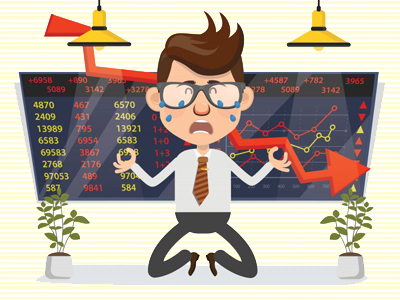Do We Face a "Minsky Moment"?
John Rubino
 And what, exactly, does that mean? And what, exactly, does that mean?
Paul Tudor Jones, a well-known billionaire hedge fund manager, recently went on CNBC to warn about the impact of America’s soaring government debt. As reported by Kitco:
The Tudor Investment founder and CIO expressed concerns that if the U.S. continues to spend beyond its means, a major sell-off in the bond market could ensue, leading to a spike in interest rates.
“The question is: after this election, will we have a Minsky moment here in the United States and U.S. debt markets?” Jones questioned. “Will we have a Minsky moment where all of a sudden there’s a point of recognition that what they’re talking about is fiscally impossible, financially impossible?”
So What is a Minsky Moment?
If we’re headed for this scary event, now might be a good time to flesh out the concept and see if it fits today’s world. So here’s an AI summary:
A Minsky moment refers to a sudden and severe market collapse following a prolonged period of speculative investment and rising asset prices. The term is named after economist Hyman Minsky, who theorized that financial markets move through cycles of stability and instability.
According to Minsky, during periods of economic stability, investors become increasingly confident and engage in riskier investments, leading to asset bubbles. However, when the market reaches a tipping point, often triggered by a negative event or realization, confidence quickly evaporates, resulting in a rapid decline in asset prices and a financial crisis. Essentially, a Minsky moment captures the shift from euphoria to panic in financial markets.
Okay, that fits pretty well. Major stock indexes are near all-time highs, US home prices exceed — by a wide margin — those of the 2007 bubble, government deficits are stuck at $2 trillion a year, and wars are breaking out everywhere.
So how do we position ourselves for what’s coming? Back to the Paul Tudor Jones article:
(Kitco News) – The list of prominent figures warning about the U.S. government’s current fiscal deficit and the increased spending promised by both presidential candidates continues to grow as a respected billionaire hedge fund manager recently suggested that rising bond prices could force unexpected actions from the government following the election.
“We are going to be broke really quickly unless we get serious about dealing with our spending issues,” Paul Tudor Jones told CNBC’s Andrew Ross Sorkin on Tuesday.
The Tudor Investment founder and CIO expressed concerns that if the U.S. continues to spend beyond its means, a major sell-off in the bond market could ensue, leading to a spike in interest rates.
“The question is: after this election, will we have a Minsky moment here in the United States and U.S. debt markets?” Jones questioned. “Will we have a Minsky moment where all of a sudden there’s a point of recognition that what they’re talking about is fiscally impossible, financially impossible?”
To help offset the deficit, the government has to sell Treasury bonds, and with investors around the world becoming increasingly cognizant of the rapidly rising U.S. debt, demand for Treasuries is waning, which means that the rate of return will need to rise to stoke more demand.
However, with the U.S. federal debt now above $35.7 trillion, any rise in interest rates only compounds the matter as the government is forced to sell even more Treasuries to cover the cost of servicing the debt, further adding to the deficit.
Jones noted that the budget deficits increased under both the Trump and Biden administrations, which led him to say that Trump and Vice President Kamala Harris are “least suited for the job ahead of them” regarding the budget. He also expressed concerns about another rise in inflation, especially if Trump wins and implements his planned tariffs.
“All roads lead to inflation,” he said. “I’m long gold, I’m long Bitcoin (BTC). I think commodities are so ridiculously under-owned, so I’m long commodities. I think most young people find their inflation hedges via the Nasdaq, which has also been great. I probably want to have some basket of gold, Bitcoin, commodities, and Nasdaq, something like that, and I want to own zero fixed income.”
As for how the government can remedy the problem, Jones said the only way to do that is to “inflate away the debt.”
“The playbook to get out of this is that you inflate your way out … you run interest rates below inflation and nominal growth rates above inflation, and that’s how you reduce your debt to GDP,” he said, adding that the Federal Reserve should continue to cut interest rates. “Historically, the way every civilization has gotten out is they’ve inflated away their debts.”
‘Ridiculously Under-Owned’ Commodities
If inflating away trillions of dollars of debt is the only solution, then the things that governments can’t make more of — i.e., commodities — should go up in dollar terms, thus offsetting the decline in the currency’s value. See our Portfolio for specific ideas.
John Rubino's Substack is a reader-supported publication. To receive new posts and support my work, consider becoming a free or paid subscriber.

DollarCollapse.com is managed by John Rubino, co-author, with James Turk, of The Money Bubble(DollarCollapse Press, 2014) and The Collapse of the Dollar and How to Profit From It (Doubleday, 2007), and author of Clean Money: Picking Winners in the Green-Tech Boom (Wiley, 2008), How to Profit from the Coming Real Estate Bust (Rodale, 2003) and Main Street, Not Wall Street (Morrow, 1998). After earning a Finance MBA from New York University, he spent the 1980s on Wall Street, as a Eurodollar trader, equity analyst and junk bond analyst. During the 1990s he was a featured columnist with TheStreet.com and a frequent contributor to Individual Investor, Online Investor, and Consumers Digest, among many other publications. He currently writes for CFA Magazine.
rubino.substack.com
| 

